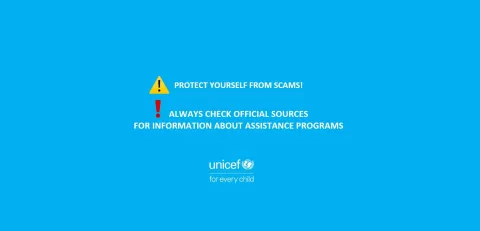The Center for Independent Journalism and UNICEF, in partnership for the media and information literacy of children and adolescents in Romania
Students, teachers, but also those who are preparing for a career in teaching, are discovering how to fight the phenomenon of online and offline disinformation.
- Available in:
- English
- Română
BUCHAREST, 17 March, 2021 - The Center for Independent Journalism (CIJ) and UNICEF in Romania are announcing the launch of a partnership through which children and adolescents in Romania will acquire media skills to support their development and of a generation of citizens who actively participate in civic life. The approach is part of the CIJ’s media and information literacy programme, which addresses an essential and urgent form of education for young people, especially in the context of the COVID-19 pandemic, when misinformation and disinformation have reached alarming levels.
UNICEF supports the CIJ in developing a complex model for increasing the media literacy skills of students and teachers, through dedicated training modules, and learning and teaching materials created specifically for this program. Media literacy is essential to reduce growing disinformation, which threatens the hard-earned progress of society.
UNICEF also supports the CIJ in developing, for the first time, a module for including the elements of media literacy in the initial training of future teachers - students in the master's programme "Didactics of Philological Disciplines" at the Faculty of Letters, University of Bucharest.
Among the components of the partnership is the organizing of a teaching activity of media literacy for students and teachers, on the World's Largest Lesson model, successfully implemented by UNICEF in recent years, with tens of thousands of students and thousands of teachers as beneficiaries. Tens of thousands of children and young people in Romania will learn, through this activity, the importance of providing correct information and how they can critically and responsibly interact with the media, developing a partial immunity to the effects of disinformation.
In the next period, the CIJ and UNICEF will carry out training activities in the area of media and information literacy for the members of the National Council of Students and those of the Romanian Children's Board - an informal group set up at the UNICEF’s initiative. The trained young people will disseminate information about media education to their colleagues.
In May 2021, the CIJ, with the support of the Romanian-American Foundation and UNICEF, will organize a national media literacy conference for teachers, students and other civil society actors. The event aims to increase the level of information on the role of media literacy in stimulating the civic participation of children and young people, but also to raise awareness of best practice models in media literacy at national and international level, which can be applied in formal and non-formal educational contexts.
Within the partnership, CIJ and UNICEF will organize discussion sessions on the development of media literacy with school inspectors for the Romanian language and literature.
"The safety and health of children is not just about ensuring basic needs. The online environment is becoming a dominant part of their lives and brings with it a number of vulnerabilities, including disinformation, cyberbullying and exclusion. It is crucial that they acquire skills that will help them decipher the equations of disinformation, recognize the error in hate speech grammar and know that they have the right to ask for help and protection," said Cristina Lupu, executive director of the CIJ.
"After a year in which the COVID-19 pandemic has wreaked havoc, it is clearer than ever that there is a need for media education for children and young people, for action to prevent the spread of misinformation and to promote the rapid dissemination of scientifically based information," said the UNICEF Representative in Romania, Pieter Bult. "We must act now to stop the pandemic of false information that, because it affects trust in medicine and science, endangers the health and lives of children."
According to an IJC study on the interaction and media use skills of young people (14-19 years old), the majority (90%) use the Internet as their primary source of information. Young people trust information that is clear and easy to understand (77%), if it comes from a reliable source (75%), comes from the Internet (50%) and does not contradict their beliefs (69%).
Media contacts
About UNICEF
UNICEF promotes the rights and wellbeing of every child, in everything we do. Together with our partners, we work in 190 countries and territories to translate that commitment into practical action, focusing special effort on reaching the most vulnerable and excluded children, to the benefit of all children, everywhere.
For more information about UNICEF and its work for children, visit www.unicef.org.




